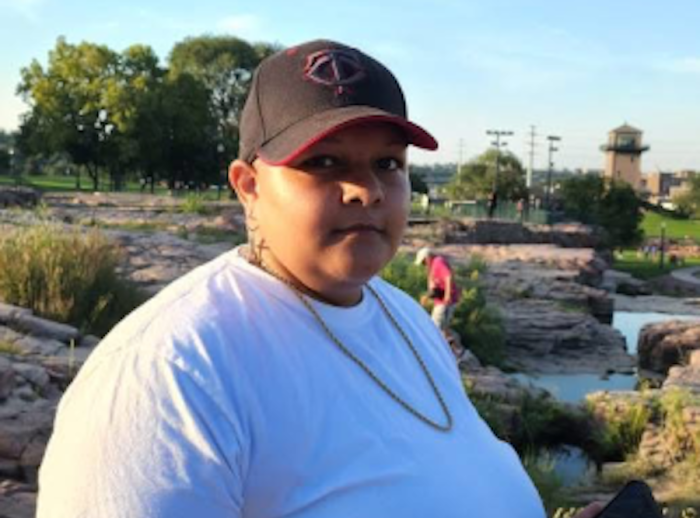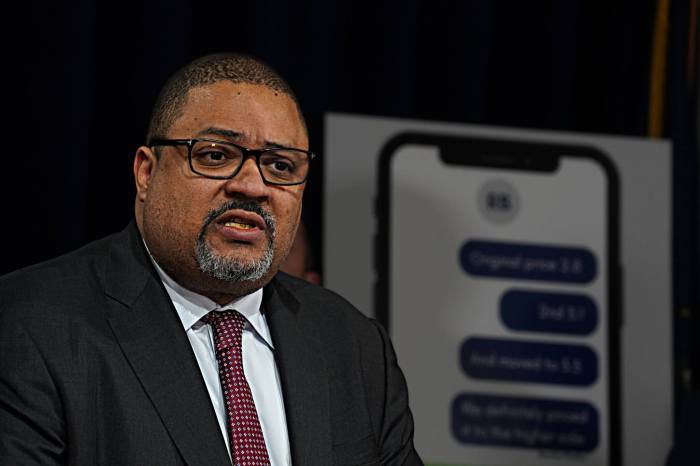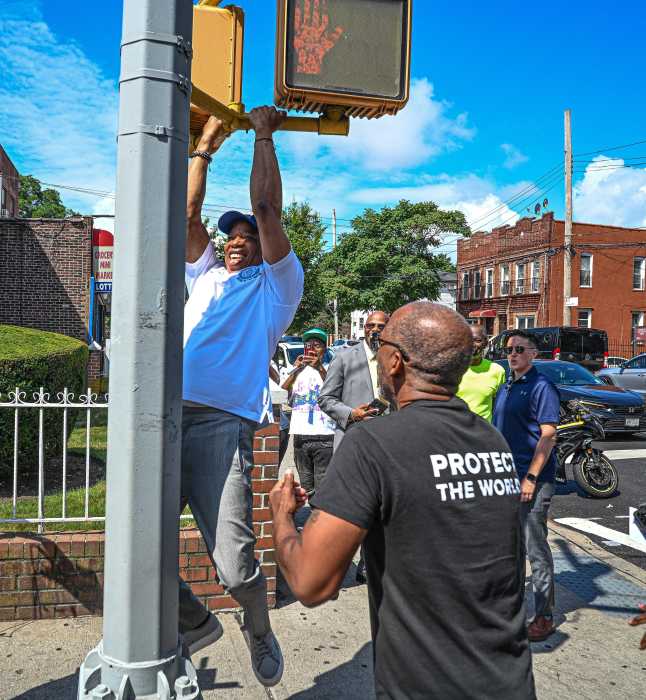It began as an ugly hate crime, when a group of white men and women outside a South Minneapolis biker bar on a June night in 2011 shouted racial and homophobic slurs at several African Americans walking by, including Chrishaun “CeCe” McDonald, a 23-year-old transgender woman –– described by friends as “slight” –– who was studying fashion at a local college.
One of the whites, Molly Flaherty, whom Hennepin County Attorney Mike Freeman described to Gay City News as a “biker woman,” allegedly smashed a glass against McDonald’s face, causing a gash that required 11 stitches. At that point, a fight ensued, and one of McDonald’s harassers, Dean Schmitz, 47, who had a criminal record and a swastika tattoo on his body, ended up dead, stabbed by fabric scissors McDonald pulled from her purse.
Freeman’s office charged McDonald with second-degree murder, which the county attorney said would have landed her in jail for 15 years upon a conviction. On May 2, in Judge Daniel C. Moreno’s courtroom, McDonald pled guilty to second-degree manslaughter and will be sentenced on June 4 to 41 months in prison. With six months taken off that for time served and one third of the remaining sentence eliminated for good behavior, the young woman would spend two more years in jail.
According to Hersch Izek, McDonald’s attorney, the case was “absolutely” overcharged. In early discussions with Freeman’s office, he said, the prosecutor offered to charge his client with second-degree manslaughter, but as an “intentional” crime, rather than the “unintentional” charge later agreed upon in the final plea agreement.
McDonald rejected that original offer, at which point, the murder charge was made.
“She was being punished for not taking the plea offer,” Izek said.
The murder charge sparked considerable outrage among McDonald’s companions that night and other friends, within the Twin Cities’ sizeable LGBT community, and on the part of transgender advocates there and nationwide.
Dean Spade, who in 2002 founded New York’s Sylvia Rivera Law Project, which provides free legal services to transgender, intersex, and other gender-nonconforming clients, and now teaches at Seattle University, attended some of McDonald’s pre-trial proceedings, including the May 2 plea hearing.
On his Facebook page, Spade described McDonald’s appearance that day: “Horrifying to watch her forced to recount the events of her attack on the stand, to watch the judge speak to her condescendingly about how pulling scissors out of her purse as her attacker chased her down the street unlawfully endangered her attacker. This system is so disgusting.”
Mara Keisling, who as executive director of the National Center for Transgender Equality is the trans community’s leading advocate in Washington, released a statement saying, “I’m really torn up about this case. Here we have a justice system that’s criminalized CeCe for surviving… And this is a painful truth for so many other transgender women of color who’ve been victimized by hate and fear.”
Freeman has a different view of the case’s conclusion. His team of prosecutors, he said, had the elements of a manslaughter conviction “locked up tight” –– in front of Moreno, McDonald acknowledged she held the scissors that went into Schmitz’s heart, that she handled them in a way that caused “unreasonable” risk to him, that he was unarmed, and that she understood her legal duty to handle a weapon so that nobody is harmed. Those statements on the defendant’s part, the county prosecutor said, were sufficient for the judge to accept the manslaughter plea, under which McDonald waived her right to make any future self-defense claim.
Despite McDonald’s waiver of that legal right, Izek said, he believes she did in fact act in self-defense motivated by fear.
The specific details of how McDonald’s scissors ended up in Schmitz’s heart, however, will never be determined beyond a reasonable doubt because the prosecutor’s original murder case will not go before a jury. According to her supporters, who established a website to track the criminal case against her, she told Moreno that after fighting off both the woman who attacked her and Schmitz, she tried to leave the scene to get medical attention. At that point, Schmitz pursued her, she became fearful and pulled out her scissors, and as he pulled her toward him, they entered his chest.
Prosecutor Freeman said he had not yet received the plea hearing’s written transcript, so could not say what specific assertions McDonald made, but termed her account “hard to believe,” stating she has alternately claimed that she stabbed Schmitz in self-defense and that the stabbing resulted from him pulling her toward him, and, at another point, said her original story to police was meant to cover for someone else who did the stabbing.
Izek said several of McDonald’s accounts came during her five-hour questioning immediately after she was stitched up in a hospital. Though she waived her right to counsel, Izek sought to have her statements that night kept out of any trial. Still in her hospital gown at the time of questioning, he said, she was on medication and still in pain. He argued that the traumatic circumstances of that interrogation essentially made her waiver of the right to counsel “involuntary.” Judge Moreno rejected Izek’s motion.
A letter later written to the Minneapolis Star-Tribune, which Izek said he likely would have stipulated as coming from McDonald, claimed she was not the person holding the scissors. Her attorney said that letter, too, preceded her having legal representation. Izek said he was prepared to explain McDonald’s inconsistencies in a way that a jury would have accepted.
According to Freeman and numerous press accounts, some witnesses on the scene told police they saw Schmitz pull McDonald off a brawl with her attacker and that, right after that, they heard him say, “You stabbed me,” to which she responded, “Yes, I did,” before leaving the scene.
Without going into the specifics of a case that will never be tried, Freeman made clear that the account from these witnesses formed the basis of his approach to prosecuting McDonald. He also emphasized that the county attorney and the judge, having accepted McDonald’s acknowledgement of the key elements required for a manslaughter conviction, including having acted “unreasonably,” could still move forward in accepting the plea arrangement despite her account in court last week of the moment the scissors entered Schmitz’s body.
But Izek insisted that the witnesses who related the account of Schmitz saying, “You stabbed me” confirmed that the exchange took place after he had followed McDonald as she tried to leave the scene. With Schmitz’s back to the witnesses, Izek said, nobody actually saw the scissors go into his chest.
Izek said he was “fully prepared” to go to trial with a self-defense theory of his client’s case. The decision to accept the plea deal, he said, was McDonald’s.
The county attorney conceded that there was courtroom debate about expert testimony regarding the transgender community. In the end, a University of Minnesota professor would be allowed to testify, but only, according to the Twin Cities Daily Planet, about the definition of the word “transgender,” not about the findings of the National Coalition of Anti-Violence Projects that of all LGBTQ hate murder victims, about half are transgender women. The prosecutor insisted that, despicable as the conduct of the crowd outside the biker bar was, the case was not about crime statistics, criminal records, or Nazi tattoos, but rather what happened in a few short minutes during which McDonald pulled scissors out of her purse.
Asked whether he thought the prosecutor’s office acted out of animus toward McDonald as a transgender woman in charging her with murder, Izek said he did not. Instead, he believes, Freeman’s office was “insensitive” and “unsympathetic” to the dangers McDonald would have perceived.
“They viewed it as a bar fight,” he said.
In a post on bilerico.com, Dr. Jillian Weiss, a professor of law and society at Ramapo College of New Jersey, wrote, “There was no media coverage, discussing how she bravely stood her ground.”
Anticipating that sort of critique, Freeman argued that Minnesota, unlike Florida, offers “a fairly limited self-defense and castle defense.” Outside the home, potential victims have an obligation to retreat if possible and use only as much force as is proportional to the threat. McDonald exceeded that limitation, he said.
The “initial skirmish” that June evening, the prosecutor said, was “clearly homophobic and perhaps racist, but clearly homophobic.” Though Hennepin County has transferred jurisdiction over the investigation of Flaherty, the woman alleged to have attacked McDonald, to a nearby county –– citing the inherent conflict in prosecuting both her and her assailant — Freeman was confident that a first-degree assault charge is imminent in that case. He could not speak to whether it would be prosecuted as a hate crime.
Izek said he also expected Flaherty’s indictment for first-degree assault but was also unsure about the hate crime element.
Expect those who rallied to McDonald’s defense to follow that prosecution carefully, just as they have vowed to turn out in big numbers for her June 4 sentencing.
Izek said that the next legal issue McDonald’s defense team will face is how she will be incarcerated. He suggested a lawsuit might be required to keep her out of a men’s facility.
In a press release issued the day of the plea deal, Freeman said, “This outcome is an example of the criminal justice system responding proportionately to a tragic situation.” He is under no illusions, however, that McDonald’s many supporters and sympathizers will accept any but the last two words of that sentiment.


































